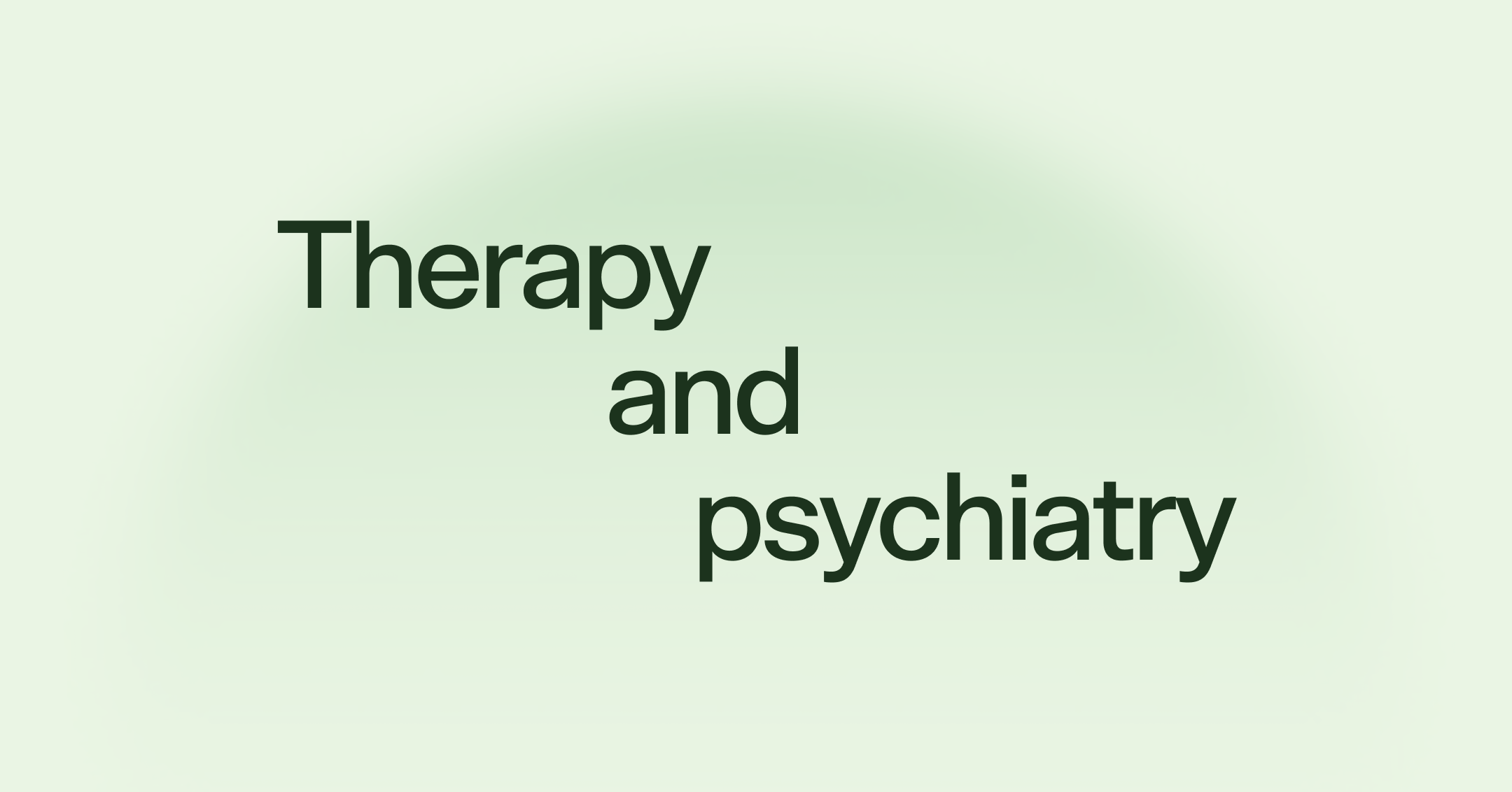Finding the right person to help you on your mental health journey is a courageous step toward improving your mental health. If you find yourself needing help, you’re not alone. One in five Americans experience mental health challenges each year.
Everyone’s mental health needs are different. Some people work only with a therapist, and some work only with a psychiatric provider. Many people work with both.
Understanding the differences between therapy and psychiatric care can help you take the first step toward finding the care that’s right for you.
Here are the most important takeaways:
Therapy and psychiatry are both provided by highly trained mental health professionals. A major difference between them is psychiatry may involve prescribing medications.
One major factor to consider when deciding between therapy and psychiatry is the severity of your symptoms. If severe symptoms disrupt your daily life, it’s a good idea to see a psychiatric provider. If your symptoms are mild or moderate, therapy may be a better fit.
To get help, start by scheduling an appointment with a behavioral health provider. They can help you understand your options and next steps, and can refer you to other types of care if needed.
Rula makes it easy to find a therapist or a psychiatric provider who’s in network with your insurance.
The care you need, when you need it
Learn how Rula can support your mental health journey
What’s the difference between therapy and psychiatry?
Therapy is a broad term for mental health treatment where a trained provider helps you process the challenges you’re facing in your life, usually through talk therapy.
Psychiatry is also a type of mental health treatment. Psychiatric treatment is distinct from therapy. It involves working with a clinician who is a medical provider who may prescribe medication to treat mental or behavioral health issues.
Both therapists and psychiatrists can help you understand what’s going on with your mental health and help you feel better — they just use different tools in the process. A therapist’s main tool is talking you through the things you’re experiencing. A psychiatrist, on the other hand, approaches care with a holistic medical lens. If you’re diagnosed with a mental health condition, they can prescribe medication to help you improve.
What kind of training do therapists and psychiatric providers complete?
Both therapists and psychiatric providers are highly specialized healthcare professionals with substantial mental health training.
Therapists need a master’s degree in counseling, psychology, or social work to become licensed and see patients. And on top of that, therapists do about 3,000 hours of supervised clinical hours before obtaining their license.
Psychiatric providers need a medical degree and specialized training to become licensed and practice as psychiatric providers.
A psychiatrist is a medical doctor who specializes in the diagnosis and treatment of mental health conditions. A psychiatric nurse practitioner is a highly trained nurse with an advanced degree and mental health certification. Both psychiatric doctors and psychiatric nurse practitioners can prescribe medications. Therapists can’t prescribe medications.

Can therapists and psychiatric providers work together?
Your mental health care needs might change over time. For example, if you’re currently in therapy and you aren’t making progress in your treatment goals (or your symptoms are getting worse), your therapist might refer you to a psychiatric provider. From there, your psychiatric provider can do a thorough medical evaluation and help you understand if medication could be helpful.
It works the other way too: psychiatric providers can also refer their patients to therapists. And for many conditions, a patient might see both a psychiatric provider and a therapist for the whole course of treatment.
How do I know which kind of treatment is right for me?
Below, you’ll find some factors that can help you decide between therapy and psychiatry. You can always schedule an initial consultation with either a therapist or a psychiatric provider to discuss your options and needs.
Therapy may be the best fit for people who:
Are experiencing mild or moderate symptoms that are not causing significant issues with daily functioning
Are not interested in taking medication to treat mental health issues
Are experiencing issues that are relationship-based, or are looking for couples counseling
Psychiatry may be the best fit for people who:
Are experiencing debilitating mental health symptoms that interfere with daily functioning
Are interested in exploring medications as part of their mental health treatment
Have taken medication for mental health conditions in the past
Have been diagnosed with a condition known to be responsive to medication as a part of treatment (like depression or anxiety)
Have been doing therapy consistently, but aren’t seeing improvement
Have been prescribed behavioral medications by their primary care provider but aren’t seeing improvements
Dig deeper:
What should I know about cost and insurance coverage for therapy and psychiatric services?
If you have insurance, it’s a good idea to check in with your insurance provider to get more details about your plan’s coverage for psychiatric care and therapy. If you don’t have insurance, you can ask your service provider directly what the out-of-pocket cost is per visit.
Insurance coverage can differ for each service, so checking in ahead of time can help you understand what costs to expect from each type of treatment.
Interested in using Rula to find a therapist or psychiatric specialist? Check out these FAQ’s:
How do I sign up for therapy with Rula?
To get scheduled with a therapist through Rula, click here. You’ll enter some info about what you’re looking for in a therapist, and select your therapist from a curated list of therapists who match your needs and your schedule.
How do I sign up to see a psychiatric specialist with Rula?
To get scheduled with a Rula psychiatric specialist, click here. You’ll provide some details for our care team and enter your insurance information. From there, a member of our team will help get you scheduled with a psychiatric specialist.
Does Rula have any age limits for therapy or psychiatric services?
For therapy, Rula works with patients who are at least five years old. For psychiatric services, Rula works with patients 13 and over.
How will I meet with my provider?
All of our appointments take place on secure video calls. If you’re working with a psychiatric service provider, you’ll have access to a clinician between visits if you have urgent questions or need a medication refill.
What happens if I’m interested in both therapy and psychiatric services?
If you’re interested in both psychiatry and therapy, we’ll get you scheduled for therapy first then confirm your appointment for psychiatric services.
Who can use Rula to find a therapist or psychiatric service provider?
Rula works with major insurance carriers nationwide to help patients get high-quality care at an affordable price. There aren’t any prerequisites for either service at Rula.
Is there any extra cost to use Rula?
There’s no additional fee to use Rula. And, if you sign up for therapy or psychiatric services with Rula, we’ll email you an estimate of your cost per session before your first appointment.
The 988 Suicide and Crisis Lifeline provides 24/7, confidential support with trained crisis counselors. If you or a loved one is in emotional distress or having a mental health crisis, please call or text 988.
Find therapists near you
New York, NY – Houston, TX – Rancho Cucamonga, CA – Austin, TX – Chicago, IL – Los Angeles, CA – Columbus, OH – Dallas, TX – Jacksonville, FL – Charlotte, NC – Denver, CO – Huntsville, AL – Philadelphia, PA – Seattle, WA – Find your city
Rula's editorial process
Rula's editorial team is on a mission to make science-backed mental health insights accessible and practical for every person seeking to better understand or improve mental wellness.
Members of Rula’s clinical leadership team and other expert providers contribute to all published content, offering guidance on themes and insights based on their firsthand experience in the field. Every piece of content is thoroughly reviewed by a clinician before publishing.





